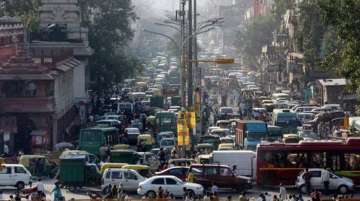The 19th-century Clock Tower in Old Delhi which was demolished soon after Independence is all set to be 'brought back' to the Walled City as part of the ongoing Chandni Chowk redevelopment project.
The Shahjehanabad Redevelopment Corporation (SRDC) in its meeting recently approved the plan to rebuild the iconic Ghantaghar that once stood in front of the over 160-year-old Town Hall, Chandni Chowk AAP MLA Alka Lamba said.
Lamba, also the director of SRDC said, "Our engineering team is looking into old designs, photographs and documents to recreate the Clock Tower as faithfully as possible".
The Delhi Clock Tower, built by the British in 1870s with its imposing Gothic look, stood on Chandni Chowk street in front of the erstwhile MCD headquarters -- Town Hall, till about 70 years ago.
Trams used to pass by it and on August 15, 1947, the landmark was lit up and the tricolour was hoisted on top of it to celebrate the Independence Day, as shown in old black and white pictures.
"Clock Tower or 'Ghantaghar' as it is popularity known as, is part of the folklore of Old Delhi. Despite 70 years, since its demolition, many people still refer to the place by the old name. People of Shahjehanabad are very emotionally attached to it.
"So, as the area MLA, I proposed it in the SRDC meeting and it was approved by it. And, the meeting was attended by all stakeholders," Lamba told PTI. Asked if the new clock tower would be an exact replication of the original one, she said, it is not feasible to "bring back" the same structure as it was, but efforts will be made to "rebuild it as closer to the original design as possible" to "enhance the glory" of Chandni Chowk.
The SRDC as part of the Chandni Chowk redevelopment project is making a nearly 1 km-long dual carriageway stretch of the famed street, from Fatehpuri Mosque to Red Fort, pedestrianised to bring back the charm of Chandni Chowk.
"We have really gone into the intricacies of all aspects to ensure the heritage look is not compromised anywhere. And, so for signages, we are using stones, and care has been taken in choosing lamp posts and street furniture which harmonise with the heritage setting," Lamba said.
Currently, the electric wires have been put underground and other civil work is being done, besides working on the beautification plan, she said. The issue of placement of transformers and other public utilities like toilets, on the central verge had drawn sharp reaction from various urban planners and conservation architects, which led to a PIL being filed in the court.
The Delhi Urban Arts Commission (DUAC) had also asked SRDC to relook into the plan. A team from DUAC had also visited the project site. Asked about the status on the placement of utilities, Lamba claimed, the matter has been decided by SRDC and the aggrieved parties were asked to visit the site and see for themselves that "these transformers were placed at such a height that they won't hamper the view of the heritage vista".
"So, after their visit, we have decided to put the utilities on the central verge. We tried looking for alternative spots, but it could not be worked out. Besides, traders were against placement of transformers on pavements as it will be a potential fire threat. So, this was the only way out," the AAP MLA said.
The SRDC director said, in the meeting she had also proposed "introducing e-trams" which is being considered as of now but final decision is yet to be taken. "We can't do track-based trams but electric trams is a feasible idea," she said.
The project also includes facade refurbishment of various heritage buildings lining up Chandni Chowk on both sides. "Public buildings like State Bank of India, colonial-era churches and old mansions with ornate facade line up Chandni Chowk. We are drawing up a plan to beautify the facade and illuminate them to enhance the recreational experience of people," Lamba added.
Chandni Chowk is a Mughal-era street, with a vibrant market, built by emperor Shahjehan's daughter Jehan Ara. During the British rule, several buildings came up in the area, including iconic public landmarks like the Town Hall and the Clock Tower, which was demolished in 1950s after a part of it had fallen off.
Historian Sohail Hashmi, who conducts regular heritage walk in old Delhi, said, "Rebuilding an icon which is long gone is not a good idea. Instead, the authorities should focus on restoring heritage that is still standing and needs immediate attention, like the Town Hall".
Latest India News
